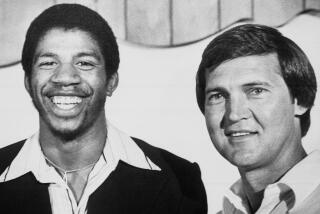AZT Might Be Next for Magic : Aftermath: The drug slows the progress of AIDS virus but can have serious side effects if the disease is fully developed.
- Share via
Magic Johnson, like thousands of other Americans infected with the virus that causes AIDS, will begin some form of treatment to try to combat an HIV infection, one of his doctors said Saturday.
Johnson’s condition is at the point in the HIV spectrum at which drug therapy is used, said David Ho, director of New York University’s Aaron Diamond AIDS Research Center.
Although details of Johnson’s treatment were not disclosed, his immune system has suffered enough damage to begin use of a life-prolonging drug such as AZT, the most common therapy available in battling the human immunodeficiency virus.
AZT, or zidovudine, is known to delay symptoms in infected people who are not yet sick and slow the progress of the disease in those with early symptoms. AZT can produce such side effects as bone marrow destruction, liver damage, anemia and nervous system problems in those with fully developed AIDS, but appears to be less toxic in those who do not yet have the symptoms or who show early signs of the virus.
Johnson, the 12-year Laker star who announced his retirement Thursday, is not yet suffering from any of the physical symptoms of the virus, Ho said.
Although Ho would not disclose Johnson’s CD4 or T-helper cell count, experts say treatment usually begins when counts reach levels of 500 per milliliter of blood. The normal count ranges from 800 to 1,000.
The T-helper cells, critical white cells that often are the target of the virus, can indicate the extent of damage to the body’s immune system.
When T-helper cells drop to less than 200, doctors suggest taking “aerosol pentamidine” to prevent pneumocystis carinii pneumonia, which can be fatal.
“The American public has got to appreciate that there are certain things that these public figures would still like to keep private,” Ho said. “They cannot ask when he (Johnson) had this disease or what his CD4 cell count is.”
Ho said Johnson learned that he was infected within the last two weeks, and that his personal physician, Laker internist Michael Mellman, was surprised by the HIV screen result.
“It was a total shock to everyone involved,” said Ho, who left the UCLA Medical Center a little more than a year ago to head the New York institute.
Ho, who trained with Mellman at the Cedar Sinai Medical Center in Los Angeles, where both served as chief residents, said he was asked by Mellman to assist in the evaluation of Johnson’s laboratory tests about two weeks ago.
“Dr. Mellman called saying there was a suspicion of a positive test,” said Ho, an internist whose subspecialty is infectious disease. “It had to be checked out by normal procedures.
“My personal reaction was similar to that of most Americans in the last couple of days. Total shock. It’s just very sad.”
Ho said he spoke to Johnson for the first time on Wednesday, the day before he announced his retirement. Ho said they discussed the medical issues and the ramifications of making a public statement.
“It was strictly his own decision,” Ho said, adding that Johnson did not dwell on such issues as how he contracted the virus.
Mellman said Friday that the doctors believe Johnson contracted the infection through heterosexual contact because he told the physicians that he is not a homosexual or an intravenous drug user. Homosexual activity and the sharing of infected needles in drug use are considered high-risk categories of transmitting the virus compared to heterosexual activity. Experts warn, however, that any form of sex without condoms can lead to the acquired immune deficiency syndrome.
During his discussion with Johnson, Ho emphasized maintaining a positive outlook, a characteristic that has made Johnson an international sports figure. They discussed Johnson’s winning attitude on the basketball court, and how he could transfer that to his latest challenge. The researcher said Johnson clearly understood the medical implications before making his announcement last Thursday.
“Magic is not in a state of denial, absolutely not,” Ho said. “I think there are a lot of people who take on a very positive attitude that Johnson did. If you begin to give up and neglect yourself, it becomes a self-fulfilling prophesy.”
In general, Ho said he counsels patients about the availability of life-prolonging drugs as well as those in development to give them hope.
“It would be a shame not to prolong a patient’s life in case that one of those drugs turns out to be something very magical,” he said.
Ho said he doesn’t believe he influenced Johnson to quit playing immediately.
“He did that on his own,” Ho said.
But the researcher endorsed the decision.
“We know that kind of lifestyle is very demanding and potentially harmful to the immune system,” Ho said. “It is more common sense than anything.
“It doesn’t mean Johnson is just going to sit at home. He’s still going to do his exercises and play light basketball for fun. But the extreme stresses of professional basketball are not good for him.”
Ho also clarified that test results on Johnson’s wife, Cookie Kelly, are negative for the HIV antibodies as well as HIV infection. He said there is no evidence that Kelly, who is seven weeks pregnant, has the virus or any reaction to it.
“I think we all have to presume she is completely negative,” he said, adding that as extra precaution doctors will repeat the HIV screen in a few weeks.
“If that test is negative, everyone will consider the situation closed for her,” Ho said.
Ho said he does not know why Johnson sat out five games--two exhibitions and three regular-season games--before announcing his retirement. Team officials said that Johnson was suffering from flu and was fatigued, but the timing has been questioned.
“Many things need to be tracked down,” Ho said. For instance, he said it is difficult to determine whether a case of shingles, a form of herpes that causes a painful skin rash, that sidelined Johnson in 1985 was a result of the virus. Shingles are one of the common symptoms of people infected with AIDS. But Ho said it is not a condition that would lead to a diagnosis of the virus.
In Johnson’s case, it took a routine physical examination in October to alert doctors to a potential problem. He was tested as a prerequisite for an insurance policy.
More to Read
Sign up for Essential California
The most important California stories and recommendations in your inbox every morning.
You may occasionally receive promotional content from the Los Angeles Times.













